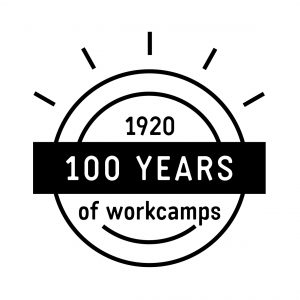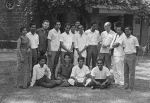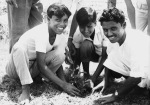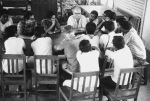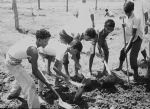Workcamps – 100 anni di storie
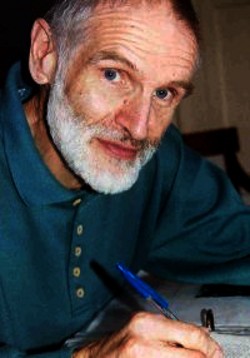
Name of the testimonial: Roger Gwynn
Sending Organization: IVS (SCI UK)
Year of the workcamp: Early 60′
Place of the workcamp: a village in the Taunus region of Germany
Host organization: local organization Aufbauwerk der Jugend (‘Young People for Reconstruction’)
What was your motivation to join a workcamp?
It’s easy to edit one’s past to make it more flattering: “As I had useful skills to share, I decided to devote a couple of years of my life to serving as a volunteer in the third world. My social conscience prompted me to do my bit in the battle against injustice and poverty. I was glad to be able to contribute something to the community where I was posted.” But I shall try to be honest. To explain satisfactorily how and why I became a volunteer I need to start at the beginning.
I was born in 1941 in London. At that time bombs were falling, food was rationed, and our neighbourhood was full of refugees from the Nazi regime; yet my family was hardly affected by these circumstances, and my childhood was a remarkably sheltered one. I attended a succession of private schools. Being teachable and obedient, rather than academic, I did well in class. In due course I secured a place at university. But I was not ready for college, or, indeed, for life outside the cosy circle of home and school. I knew nothing whatever about society or politics, had no views about wealth and poverty, privilege and exploitation, was clueless about how other people lived. On top of that I had no ambition and no spirit of enterprise – I was so used to being told what to do, then doing it and receiving a pat on the head, that I could imagine no other way of carrying on. So I was ill at ease amid the wild unfettered ferment of college life. But I did yearn to travel and see the world.
As a student with limited resources, I looked around for cheap ways of exploring Europe in the vacations, and discovered two useful money-saving tools: hitchhiking and workcamping. Hitchhiking to move around, workcamping to stay in a place, see the area, meet people.
What did you take from that experience?
My first workcamp was in a village in the Taunus region of Germany. It was run by a small local organization called Aufbauwerk der Jugend – roughly speaking, ‘Young People for Reconstruction’. There were volunteers from Germany, France, Denmark, Sweden, Algeria and England. The work was unambitious – cleaning up the public areas in the village – but the camp was a great success; the volunteers bonded into a very happy team, and the village people made every effort to work with us and make us feel at home.
The second World War had ended only fifteen years earlier, so reconciliation and the need for mutual understanding between nations were live issues; in this way the camp may have resembled some of the earliest SCI workcamps, which had been held, not far away, a mere 40 years before. Subsequently I joined a forestry camp in Austria held by the Steiermarkischer Waldschutzverband (Styrian League for Forest Protection); a camp preparing relief goods in Sweden under the aegis of a tiny organization with big ideals called Agni (from the Sanskrit word for Fire); a camp in Spain run by the Delegacion Nacional de Juventudes (National Youth Organization), where the aim was to improve the civic amenities in a coastal tourist town. Each of these camps had its own distinct character; all involved volunteers from at least three countries, but none recaptured the spirit of international brotherhood and reconciliation which had so impressed me in my very first workcamp.
What do you still carry with you?
What does it all prove? Well, I suppose it shows that even a cosseted dilettante who drifts into voluntary service with mixed and dubious motives is not beyond redemption. By any objective measurement I was a pretty useless LTV; yet I think some positive good resulted from the periods of unfocussed messing-about in far-off lands which I was lucky enough to get away with. Certainly it changed me; gradually, over the years, my SCI experiences forced me to think more seriously about major international and communal issues – economic disparity, exploitation, racism – and my own role in it all. I found some purpose in life. These were huge gains for me; though of course, whether or not anybody else benefited is open to doubt.
As far as I’m concerned, my time with SCI brought three specific benefits. Firstly, the habits of patience and frugality which workcamping inculcated in me have taught me to enjoy life more fully, and probably also helped me to be a more responsible citizen of this crowded world than I would otherwise have been. Second, the knowledge and experience which I gathered, quite capriciously, during my years abroad eventually became useful tools in my work. But third and most important, I gained lifelong friends. It is for blessing me with these special, long-lasting friendships that I’m most grateful to SCI.
Pictures from a later workcamp in Dhaka, 1967
